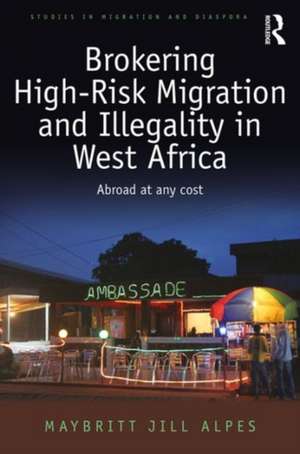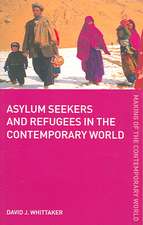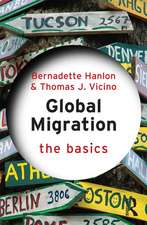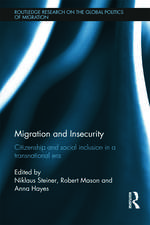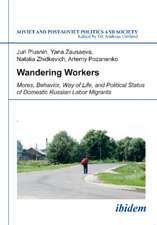Brokering High-Risk Migration and Illegality in West Africa: Abroad at any cost: Studies in Migration and Diaspora
Autor Maybritt Jill Alpesen Limba Engleză Hardback – 24 noi 2016
This book places trafficking and smuggling within a wider framework of high-risk migration and proposes a novel interpretation of how people manage unwanted and uncertain migration outcomes. Drawing on in-depth ethnographic research with aspiring and failed migrants, their families, migration brokers and consulate offices in anglophone Cameroon, the author analyses high-risk migration from the vantage point of people in a place of departure.
Brokering High-Risk Migration and Illegality in West Africa: Abroad at Any Cost develops a critical socio-legal approach to the governance of migration that sees the state without ‘seeing like the state’. The state’s monopoly over legitimate means of mobility is continuously in the making – frequently through accusations of fraud and criminality. By revealing how authority, legality and legitimacy operate in a country of origin, the analysis contributes original insights into processes that create the conditions for illegality and migrant exploitation. The book will appeal to those in the fields of migration and development, African studies, gender, anthropology, sociology, criminology and law.
| Toate formatele și edițiile | Preț | Express |
|---|---|---|
| Paperback (1) | 412.37 lei 6-8 săpt. | |
| Taylor & Francis – 4 feb 2019 | 412.37 lei 6-8 săpt. | |
| Hardback (1) | 1109.99 lei 6-8 săpt. | |
| Taylor & Francis – 24 noi 2016 | 1109.99 lei 6-8 săpt. |
Din seria Studies in Migration and Diaspora
- 8%
 Preț: 390.51 lei
Preț: 390.51 lei - 30%
 Preț: 846.53 lei
Preț: 846.53 lei - 14%
 Preț: 338.33 lei
Preț: 338.33 lei - 31%
 Preț: 767.20 lei
Preț: 767.20 lei - 16%
 Preț: 216.07 lei
Preț: 216.07 lei - 31%
 Preț: 766.31 lei
Preț: 766.31 lei - 25%
 Preț: 767.01 lei
Preț: 767.01 lei -
 Preț: 469.34 lei
Preț: 469.34 lei - 18%
 Preț: 1061.06 lei
Preț: 1061.06 lei - 18%
 Preț: 1000.27 lei
Preț: 1000.27 lei - 31%
 Preț: 767.01 lei
Preț: 767.01 lei -
 Preț: 323.23 lei
Preț: 323.23 lei -
 Preț: 489.26 lei
Preț: 489.26 lei -
 Preț: 469.34 lei
Preț: 469.34 lei - 13%
 Preț: 338.33 lei
Preț: 338.33 lei - 28%
 Preț: 820.71 lei
Preț: 820.71 lei - 18%
 Preț: 1000.27 lei
Preț: 1000.27 lei - 12%
 Preț: 299.52 lei
Preț: 299.52 lei - 25%
 Preț: 824.70 lei
Preț: 824.70 lei - 26%
 Preț: 763.61 lei
Preț: 763.61 lei - 14%
 Preț: 337.88 lei
Preț: 337.88 lei - 18%
 Preț: 1000.27 lei
Preț: 1000.27 lei - 24%
 Preț: 322.92 lei
Preț: 322.92 lei -
 Preț: 469.34 lei
Preț: 469.34 lei -
 Preț: 489.26 lei
Preț: 489.26 lei - 18%
 Preț: 1057.89 lei
Preț: 1057.89 lei -
 Preț: 469.34 lei
Preț: 469.34 lei - 31%
 Preț: 764.69 lei
Preț: 764.69 lei - 13%
 Preț: 338.33 lei
Preț: 338.33 lei - 26%
 Preț: 819.09 lei
Preț: 819.09 lei - 18%
 Preț: 1000.27 lei
Preț: 1000.27 lei - 26%
 Preț: 819.09 lei
Preț: 819.09 lei - 18%
 Preț: 1054.71 lei
Preț: 1054.71 lei - 18%
 Preț: 1001.84 lei
Preț: 1001.84 lei - 18%
 Preț: 1054.71 lei
Preț: 1054.71 lei
Preț: 1109.99 lei
Preț vechi: 1353.64 lei
-18% Nou
Puncte Express: 1665
Preț estimativ în valută:
212.39€ • 222.94$ • 176.29£
212.39€ • 222.94$ • 176.29£
Carte tipărită la comandă
Livrare economică 11-25 aprilie
Preluare comenzi: 021 569.72.76
Specificații
ISBN-13: 9781472441119
ISBN-10: 1472441117
Pagini: 254
Ilustrații: 24
Dimensiuni: 156 x 234 x 18 mm
Greutate: 0.48 kg
Ediția:1
Editura: Taylor & Francis
Colecția Routledge
Seria Studies in Migration and Diaspora
Locul publicării:Oxford, United Kingdom
ISBN-10: 1472441117
Pagini: 254
Ilustrații: 24
Dimensiuni: 156 x 234 x 18 mm
Greutate: 0.48 kg
Ediția:1
Editura: Taylor & Francis
Colecția Routledge
Seria Studies in Migration and Diaspora
Locul publicării:Oxford, United Kingdom
Cuprins
List of Figures
Foreword by Xiang Biao: Wrestling games between a lawyer and a fortune-teller
Acknowledgments
Lexicon
Introduction: Migration risks at points of departure
1. Why aspiring migrants give money to migration brokers
2. Why migration brokers can survive failures
3. What it takes to get a visa
4. How to secure marriage at the consulate
5. Why deportations do not work
Conclusion: Human trafficking, illegality and mobility
Annex: Graph 1 and 2, Figure 10 and 11
Bibliography
Index
Foreword by Xiang Biao: Wrestling games between a lawyer and a fortune-teller
Acknowledgments
Lexicon
Introduction: Migration risks at points of departure
1. Why aspiring migrants give money to migration brokers
2. Why migration brokers can survive failures
3. What it takes to get a visa
4. How to secure marriage at the consulate
5. Why deportations do not work
Conclusion: Human trafficking, illegality and mobility
Annex: Graph 1 and 2, Figure 10 and 11
Bibliography
Index
Notă biografică
Maybritt Jill Alpes is a researcher at the migration law section of the VU University Amsterdam, senior policy officer at Amnesty International and an invited researcher at the CERI Sciences Po Paris.
Recenzii
‘Based on first rate ethnographic research, Jill Alpes illuminates how young Africans attempt to migrate ‘at all costs’. By pinpointing the paradoxes between mobility and control, the book provides fresh insights into how clandestine migration manifest itself in ways more complex than indicated in conventional human trafficking and smuggling literature.’ – Ninna Nyberg Sørensen, Danish Institute of International Studies, Copenhagen
'By standing still at the cleavage between how people prepare for migration and how receiving states regulate migration before it takes place, Alpes offers us a new vision of mobility and sets an example of how migration can be fruitfully examined by focusing on brokers, consulate officers and citizens in the global South. Ethnographically vivid and analytically insightful, this is a very timely and powerful book' – Biao Xiang, University of Oxford, UK
‘By taking the ethnographer's perspective 'from below', this book challenges dominant understandings of power and legitimacy in African migration.’ – Heidi Østbø Haugen, Journal of Peace Research
'Jill Alpes’ book on Cameroonian overseas migrants stands out as a welcome alternative as it focuses on the power of the social. She does so by adopting an extended case-study approach: the book revolves around insightful portrayals of biographic narratives and detailed descriptions of the social practices of only a handful of individuals – the migration brokers James and Walther; aspiring migrants Claire, Josephine, Pamella and Victorine; and the author’s research assistant, Delphine. Thus, the book is at odds with the academic practice that is increasingly becoming fashionable (no doubt following from shrinking research funding): to make generalizing statements based on apt illustrations. The book instead delves deeply into the layered, often contradictory, motivations as well as the social forces driving ordinary Cameroonians to venture into overseas travel, subtly linking individual issues of bushfalling (the local vernacular for overseas migration) to collective problems of involuntary immobility.' – Joost Beuving, The Journal of the International African Institue
"This is a really fascinating book that demonstrates the value of ethnography to migration research, and what it offers to our understandings of legal processes in particular." - Bridget Anderson, University of Bristol
"This book would be a valuable source for researchers and students with an interest in trafficking, human smuggling, forced migration, migrant agency and migration in West Africa." - Priya Deshingkar, University of Sussex
'By standing still at the cleavage between how people prepare for migration and how receiving states regulate migration before it takes place, Alpes offers us a new vision of mobility and sets an example of how migration can be fruitfully examined by focusing on brokers, consulate officers and citizens in the global South. Ethnographically vivid and analytically insightful, this is a very timely and powerful book' – Biao Xiang, University of Oxford, UK
‘By taking the ethnographer's perspective 'from below', this book challenges dominant understandings of power and legitimacy in African migration.’ – Heidi Østbø Haugen, Journal of Peace Research
'Jill Alpes’ book on Cameroonian overseas migrants stands out as a welcome alternative as it focuses on the power of the social. She does so by adopting an extended case-study approach: the book revolves around insightful portrayals of biographic narratives and detailed descriptions of the social practices of only a handful of individuals – the migration brokers James and Walther; aspiring migrants Claire, Josephine, Pamella and Victorine; and the author’s research assistant, Delphine. Thus, the book is at odds with the academic practice that is increasingly becoming fashionable (no doubt following from shrinking research funding): to make generalizing statements based on apt illustrations. The book instead delves deeply into the layered, often contradictory, motivations as well as the social forces driving ordinary Cameroonians to venture into overseas travel, subtly linking individual issues of bushfalling (the local vernacular for overseas migration) to collective problems of involuntary immobility.' – Joost Beuving, The Journal of the International African Institue
"This is a really fascinating book that demonstrates the value of ethnography to migration research, and what it offers to our understandings of legal processes in particular." - Bridget Anderson, University of Bristol
"This book would be a valuable source for researchers and students with an interest in trafficking, human smuggling, forced migration, migrant agency and migration in West Africa." - Priya Deshingkar, University of Sussex
Descriere
Using Cameroon as a case-study, this book shows what makes young Africans pursue migration at all costs. While the free flow of capital and commodities is often celebrated, there is no free circulation for most people. This book takes paradoxes between mobility and closure as its starting point and demonstrates local attitudes towards migration risks against the backdrop of high migration aspirations and low capabilities for Cameroonians. In showing how market, state and family actors interact within nexus that both constrains agency, yet creates productive openings, this book examines a multitude of actors and factors that create vulnerabilities for aspiring migrants.
